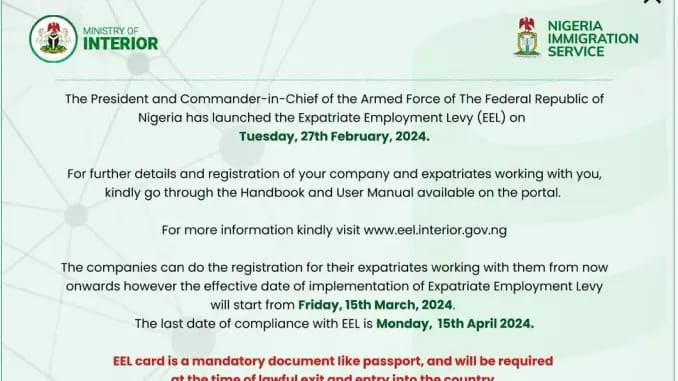The article “A Legal Justification for the Suspension of the Expatriate Employment Levy” by Success Chimdimma Ebulue provides the legal considerations surrounding the Expatriate Employment Levy (EEL) introduced by the Federal Government of Nigeria. While the author articulates the potential constitutional challenges faced by the EEL, it does not examine the broader context and possible implications of diminishing the importance of such policy interventions.
Firstly, the article’s focus on the constitutionality of the EEL may overlook the broader socio-economic objectives that the policy aims to achieve. The levy was initially introduced to bridge the gap between expatriates and the Nigerian labour force and address certain socio-economic considerations. By focusing predominantly on the legal dimension, we risk sidelining the policy’s potential benefits in fostering a more inclusive and equitable employment landscape in Nigeria.
Secondly, while the legal framework of any policy is paramount, it is also essential to consider the flexibility and adaptability of legal systems to accommodate innovative policy measures. The EEL represents an attempt by the Nigerian government to navigate complex socio-economic challenges. Legal systems are not static but evolve to reflect societal changes and needs. Thus, critiquing the EEL solely on the grounds of its current constitutional alignment may disregard the potential for legal reforms that can legitimize and accommodate such policies.
Moreover, the criticism of the EEL for its potential impact on Foreign Direct Investment (FDI) may not fully account for the multifaceted nature of attracting and sustaining FDI. While a conducive legal environment is crucial, investors also consider factors such as the quality of the labour force, local market dynamics, and socio-economic stability. Therefore, policies aimed at enhancing local employment and socio-economic equity, if well-implemented, could, in the long run, contribute positively to the investment climate.
Furthermore, the article’s emphasis on the procedural aspects of enacting the EEL, such as the necessity for it to be passed by the National Assembly, may be valid, but it downplayed the worth of executive discretion and policymaking in responding to urgent socio-economic needs. The government’s decision to temporarily suspend the EEL in response to stakeholder feedback demonstrates a willingness to engage, consult, and refine policy measures, which is a positive aspect of democratic governance that should not be overlooked.
It is equally important to engage with the broader socio-economic context and the potential of legal systems to evolve in response to innovative policy measures. The discussion around the EEL and its implications should thus be balanced, taking into consideration both the legal challenges and the socio-economic objectives at the heart of the policy. We should appreciate the comprehensive strategy of the Federal Government of Nigeria (FGN) to foster a more inclusive and equitable labour market.
The government has a prerogative to implement policies that address specific national challenges. While the constitutionality of any policy is paramount, the EEL is not merely a fiscal tool but a strategic intervention aimed at encouraging the employment of local talent, thus fostering skill development and knowledge transfer within Nigeria.
The argument that the EEL might deter Foreign Direct Investment (FDI) is not entirely tenable, because a nuanced approach to policy implementation can ensure that the levy does not become a hindrance to FDI. In many jurisdictions, similar policies have been successfully implemented without adversely affecting investment. The key lies in striking a balance between attracting FDI and ensuring that local labour markets benefit from foreign expertise and investment.
By incentivizing the employment of Nigerian workers, the policy would lead to a significant upskilling of the local workforce, ultimately contributing to the country’s long-term economic growth and sustainability. It is, therefore, more constructive to view the EEL as a potentially positive force for Nigeria’s socio-economic development, rather than dismissing it outright on legal and economic grounds. While the legal framework and economic implications of such policies must always be carefully considered, it is equally important to engage in constructive dialogue and seek innovative solutions that align with Nigeria’s broader development goals.
●Momodu is a public affairs commentator.


